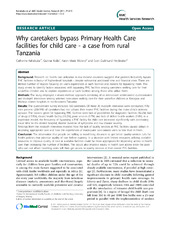Why caretakers bypass Primary Health Care facilities for child care - a case from rural Tanzania
Peer reviewed, Journal article
Published version
Permanent lenke
https://hdl.handle.net/1956/6694Utgivelsesdato
2011-11-17Metadata
Vis full innførselSamlinger
Originalversjon
https://doi.org/10.1186/1472-6963-11-315Sammendrag
Background: Research on health care utilization in low income countries suggests that patients frequently bypass PHC facilities in favour of higher-level hospitals - despite substantial additional time and financial costs. There are limited number of studies focusing on user's experiences at such facilities and reasons for bypassing them. This study aimed to identify factors associated with bypassing PHC facilities among caretakers seeking care for their underfive children and to explore experiences at such facilities among those who utilize them. Methods: The study employed a mixed-method approach consisting of an interviewer administered questionnaires and in-depth interviews among selected care-takers seeking care for their underfive children at Korogwe and Muheza district hospitals in north-eastern Tanzania. Results: The questionnaire survey included 560 caretakers. Of these 30 in-depth interviews were conducted. Fifty nine percent (206/348) of caretakers had not utilized their nearer PHC facilities during the index child's sickness episode. The reasons given for bypassing PHC facilities were lack of possibilities for diagnostic facilities (42.2%), lack of drugs (15.5%), closed health facility (10.2%), poor services (9.7%) and lack of skilled health workers (3.4%). In a regression model, the frequency of bypassing a PHC facility for child care increased significantly with decreasing travel time to the district hospital, shorter duration of symptoms and low disease severity.Findings from the in-depth interviews revealed how the lack of quality services at PHC facilities caused delays in accessing appropriate care and how the experiences of inadequate care caused users to lose trust in them. Conclusion: The observation that people are willing to travel long distances to get better quality services calls for health policies that prioritize quality of care before quantity. In a situation with limited resources, utilizing available resources to improve quality of care at available facilities could be more appropriate for improving access to health care than increasing the number of facilities. This would also improve equity in health care access since the poor who can not afford travelling costs will then get access to quality services at their nearer PHC facilities.

